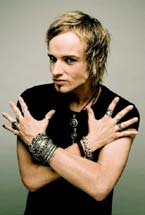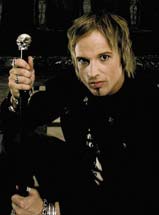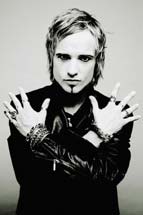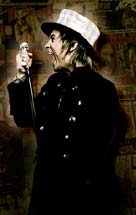|
Interview conducted April 27 2010 Interview published May 13 2010 |
With two albums released at once - entitled The Wicked Symphony and Angel Of Babylon - the Edguy front man Tobias Sammet's 'side project' Avantasia has now reached five in total. These are the last two parts of the story that started with The Scarecrow. If there will be any future stories within the Avantasia frame is yet uncertain. So is the possibility of a new live tour. But let the main man tell in his own words. Metal Covenant recently had a chat with Tobias Sammet, and this is what he had to say…
![]()
David: Congrats! Avantasia did fairly well on the Swedish charts during the first week (box: 14th place, AoB: 37, TWS: 38).
-
Tobias: Well, I can't complain. Life is good!
David: Do you know the numbers?
-
Tobias: I think that it was number 14 or something in Sweden.
 David:
That's right. Do you have any anecdote to tell from the recordings?
David:
That's right. Do you have any anecdote to tell from the recordings?
-
Tobias: It has been a very long span of time. The first drums were recorded already in 2006, when we did The Scarecrow. We have worked on and off so there are countless of anecdotes. But nobody got killed and nobody got seriously injured. It has been a tremendous journey, to travel around and work with all those different people.
David: Did you have time to socialise with the guest musicians, or was it just work?
-
Tobias: Well with most of them, but Jon Oliva and Tim "Ripper" Owens recorded their parts in the US and just sent over the files. Those aspects of the internet I don't like…
David: When did you decide to do two records at once?
-
Tobias: A lot of the material was written already when we did The Scarecrow, for 'The Scarecrow Part II'. I think we had about ten tracks left back then for the backbone. We finished The Scarecrow and after the tour and all that, and after the Edguy album and tour, we went back to finish the material. Meanwhile I had got a lot of new ideas and thought 'lets make another song', 'lets make two more songs', 'let's write four more songs'. We kept writing and all of a sudden we had 22 tracks. We found out that there was too much material to put it on one album. I didn't like the idea of a double album. I mean, I wanted to make it all accessible for people to buy as a package, but I wanted to separate the albums. Each one is so great that I wanted them to be considered as two separate albums and give each one the attention they would give a single album.
David: Isn't there a risk that you keep a few fillers that would not have made it on a single album?
-
Tobias: No, there is no filler on those albums. I know that some people may think that there are two or three fillers, that is what they think about every album. The funny thing is that everybody comes to me and says that there are two or three songs that they don't like, but they will not agree of the same songs. That's a good thing. It happens to me as well. I could easily pick out three or four songs on Number Of The Beast that I don't like as much as the rest. These albums have a very wide range, from extreme heavy metal, to AOR, to hard rock, to bluesy passages… So I fully expect people to prefer one or more of those aspects. And there are black metal fans out there who think that all the 22 songs are complete shit - and I fully respect that. So, to cut a long story short, for me there are no fillers.
David: You did a new version of "Promised Land". Why is that?
-
Tobias: It's not a new version, it's actually the original version. We needed one more track for the Lost In Space EP:s and I thought this would work perfectly. So we made an alternative version of it with Michael Kiske. The intention was to keep the original version out of what was then meant to be 'The Scarecrow Part II'. But in the end… we could have left it out and Angel Of Babylon would have been a ten-song album and it would have been 55 minutes instead of 60, but I kept it because it is needed for the story.
 David:
You are pretty much in charge over everything regarding this project.
Can [the co-producer] Sascha Paeth hold you down when you get too carried
away?
David:
You are pretty much in charge over everything regarding this project.
Can [the co-producer] Sascha Paeth hold you down when you get too carried
away?
-
Tobias: Well, puh… When we are asked who is responsible for what we always look at each other and say: 'Ok, who is responsible for what?' I got the full power. I can really say I wanna have this and I don't wanna have that so much. For me there is the chance to have the final say, and I know that and that makes me feel very good. Very great for a big ego. But usually there is a consensus. It is so big that we never have serious discussions. It's almost scary.
David: You invite a lot of singers for Avantasia. How do you decide who will do which parts? Do you write with someone particular in mind?
-
Tobias: Most of the time I have a certain character for a certain part of the story and I write the character into the music. But then of course you need a certain voice for it. For example I knew that songs like Death Is Just A Feeling or Scales Of Justice would be perfect for Jon Oliva and "Ripper" Owens respectively. It's a gut feeling. You have an instinct for what would work. You think of a singer that could portrait a feeling that you think is suitable for a certain passage. But 'picking' singers doesn't sound appropriate. I decide on which singer I ask and hope that he agrees on doing it. It's not that I'm picking everyone I like, that I can have just anybody. I'm really, really thankful that those great singers agreed on working with me.
David: Any hurtful turndowns?
-
Tobias: It always happens. I always wanted Bruce Dickinson and it hasn't worked out so far. I wanted to work with Sebastian Bach on this record. He didn't really turn me down. He was interested, but for some reason it faded away and didn't happen. He was meant to sing the lead vocals for The Edge, which I finished up singing myself - and I think I did a fairy good Sebastian Bach impersonation!
David: Is there someone you have been afraid to ask in case he would say no?
-
Tobias: No, because the worst thing that could happen is that somebody could say no. I learnt that from Eric Singer. Because when we did The Scarecrow I asked Eric if it would be appropriate to ask Alice Cooper and if he sees any chances, 'I don't know if I'll ask him'… And Eric said: 'Look Tobi, quite easy, we ask - Alice says yes or Alice says no. Worst case he says no - you won't die. What do you have to lose?' So we asked Alice and Alice said yes. So Eric taught me that asking would not result in sudden death.
David: Do you have a future dream guest?
-
Tobias: Bruce Dickinson is still somebody that I would like to work with, but at the moment I don't even think of the continuation of Avantasia. It can happen, it may be possible that it won't happen. I just finished two albums and I won't spend any minute at thinking of a new Avantasia album the next months.
 David:
Is it hard to direct all those legendary voices?
David:
Is it hard to direct all those legendary voices?
-
Tobias: No, you approach it as a fan of those voices and you are grateful and thankful that you can write the songs and passages that you want to hear from those artists. It should be any young rock musician's dream to write a song for Klaus Meine. The opportunity really beats the difficulties. It's your own little model world that you've designed and you get a chance to hear it sung by Klaus Meine or Michael Kiske or Bob Catley. I don't perceive it as work, I am a fan and I feel like a child in a toy store. When you do something that you enjoy it's no stress.
David: How would you describe yourself as a boss in the studio? From easygoing to tyrant…
-
Tobias: We are working colleagues. I'm nothing near a tyrant. You should be happy that you are allowed to work with those kinds of musicians. Most of them have been around for such a long time and have been huge influences for me. So I would never dare to be a tyrant. If I have a good idea I would surely let them know and I hope that they would let me know if they think it's a pretty bad idea. I have the final say but still it's a working-together. It's not a cock-waving contest. I believe that the atmosphere in the studio would reflect in the music that you have on tape afterwards. I believe in the old romantic musketeer vision of camaraderie.
David: You managed to bring Avantasia to the stage a couple of years ago. How do you think that turned out in retrospect? Did it live up to your expectations? Is it possible to do it again?
-
Tobias: It was great travelling around the world with all those people that you usually don't hang out with. The turnout was great and it was great to be headlining some of the biggest hard rock and heavy metal festivals. We said to ourselves that we would definitely do this again. That was under the impression of just having left the stage with 100 000 people in front at Wacken. It will be hard to get it together again, with all the people having to be available at the same time. Unfortunately I don't think that it's gonna happen.
David: Isn't it sad to write a lot of music for Avantasia that you maybe never will be able to perform live?
-
Tobias: You know I'm only 32 years old and I hope that I still have a long, long journey ahead. First it's a gift just to be able to compose the music. And every now and then we play Avantasia songs with Edguy. The good thing is that I've composed those songs and we've recorded them and that's what counts to me - so I have a half-full glass, not a half-empty one.
 David:
Do you feel that Avantasia has given you recognition beyond the metal
scene?
David:
Do you feel that Avantasia has given you recognition beyond the metal
scene?
-
Tobias: I have no clue. I don't think so. Of course I've reached new people from different genres of heavy metal and hard rock, and fans of Alice Cooper, Scorpions and Kiss who maybe wouldn't have paid attention if it weren't for the participation of Alice, Klaus Meine, Eric Singer and Bruce Kulick. When we did a song like Lost In Space some of the traditional heavy metal fans said it was too poppy, that we did it just for mainstream purpose, which is stupid. I did not write it for commercial reasons, I wrote it because I think it's a great song. It hardly got played on the radio, but when it did people just thought it was old-fashioned 80s heavy metal music and 'too heavy' anyway. So I think that heavy metal and hard rock always will be a kind of conspiracy music for a secret society. Sometimes it sneaks out of the underground but here in Germany it is very rare that a heavy metal album lands high on the charts. We have widened our horizon but I don't think that we have reached out to a new scene in the big scope.
David: In interviews you almost sound a bit bitter that the old Edguy fans don't totally embrace the evolution of the sound. But you must be proud of the band's history as well?
-
Tobias: Definitely. It depends on how people approach me and quote me. When people say that the new stuff is shit and badly played and the old stuff is great and well played I have to disagree. I was there when all those albums got produced and I can judge exactly what is right for this band - much more than anyone out there. Of course I get a little bit picky when it comes to that. But of course I'm also proud of the past. If I had a time machine and could go back in history I would not want to change anything. Vain Glory Opera was a very good and important album at that time. All I can say is that now I'm a better singer, a better songwriter and I've just developed. I know that I can do better now, which doesn't mean that you cannot enjoy those albums, because I think that they were extraordinary well done for what they were. When we did Vain Glory Opera I did not want to copy Kingdom Of Madness. When we did Theatre Of Salvation, which I think is not the best Edguy album at all, I did not want to copy Vain Glory Opera. But I want people to accept that I know better what is right for me now. Because I feel it, I sense it, I can judge from my own point of view and whatever makes me happy is the right thing. That is the only measurement. If the artist is not happy, how can he expect the music to make anyone else happy? Therefore I sometimes really get pissed of when people say 'go back to the roots'. I don't go back to anywhere. I don't go back to wearing diapers, just because people thought I was cute when I was one year old. It doesn't mean that I don't like our old albums - not at all. I just don't listen to them anymore myself.
David: You are a bit sarcastic sometimes about not being 'metal' anymore. Have you ruled out screaming speed metal like "Nailed to the Wheel", "The Final Sacrifice" and "Mysteria"?
-
Tobias: If you listen to songs like Speedhoven or The Pride Of Creation you can hear that a part of the roots is still there, and it will always be there I guess - as far as I know now. I haven't ruled it out, I'm just as you said a bit sarcastic because I know of course that some people - and I think this happens with every band - think that we are selling out and becoming pop. It's just a funny thing to overdo it: 'Hey, here is our new sell-out and commercial ballad!' The secret of being happy is to not take yourself too serious. It's just music…
Related links: